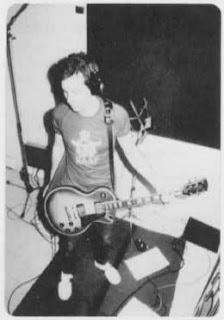Being the first punk band in Perth is like being the guy who invented planking - sure, you might've been first, but who gives a shit? Still, that hasn't stopped the mantle of Perth's First Punks being bitterly (and publicly) contested. Dave Warner has no time for such trivialities, announcing that his first band, Pus, was not only Perth's but Australia's first punk band, treading the boards at future Perth punk haunt the Governor Broome Hotel as early as 1974. Putting aside the tiresome argument of "first", the fact that Pus took primary influence from The Fugs and felt gazumped by Skyhooks' shtick suggests that Pus was one of those pre-Punk bands that was punk in intent rather than sound. That's never been of much use to us, being people who listen to music with our ears and all. Given that no Pus recordings seem to have survived, in this case we can't even do that.
The closest we get is Dave Warner's first single (Suburban Boy/Donna, EMI Custom PRS-2499), recorded in the UK at Spaceward Studios and self-released in 1976 under the name From The Suburbs. Suburban Boy was a Pus song, and though this version is less polished than the recording we all know as Warner's first release for Mushroom in 1978, the differences are pretty superficial. It isn't punk, but it does establish the parameters for Warner's subsequent work - tales of football and suburban ennui, delivered with a broad (Western) Australian accent. Those themes were also carried through in the label artwork of his next pre-Mushroom single (Summer '78/Australian Heat, Bicton BR-001, 1978), which also hints at the Perth cultural references that would come to characterise his songs, Bicton being the East Fremantle suburb where Warner grew up. The self-applied genre tag "suburban rock" encapsulates those elements, but if you want to know what Dave really thought of punk, go no further than his song of the same name.
The Mushroom releases by Dave Warner's From The Suburbs litter dollar bins from coast-to-coast, so exploring those records is easy and cheap (go and do it!). What brings us here today is a timely re-examination of the post-Mushroom, self-released Half Time At The Football 12" - timely in that Warner, like me, would be grinning from ear-to-ear after the Fremantle Dockers' preliminary final win over Sydney on Saturday night, sending Freo to the AFL grand final for the first time. If I was to really twist the blade, I'd add that half time was about the point when Sydney Swans supporters could have switched off their TVs (sorry, Professor). A live favourite and something of a career constant, Half Time At The Football is quintessential Warner, bringing to the table all of his usual thematic concerns but with a relentless, sloppy two-chord attack that would sit much more comfortably among Spaceward's credits than the '76 recordings.
Half Time At The Football [Download]
We can't leave before tying up the last of Warner's punk-era self-released records, especially given today's theme. To your right, you will see the East Fremantle Sharks' team song, released in 1979 with a blue-and-white label to echo that club's colours - that year saw East Freo defeat the South Fremantle Bulldogs to take out the WAFL premiership. Warner gets a songwriting credit and his voice is allegedly on the recording somewhere, but who can tell with the boofheads from the '79 Sharks caterwauling over the top? No sound files on this one - hell will freeze over before the East Freo team song appears on this blog. Carn the Bulldogs in 2014, and go the Dockers!
Mojo Filter - All Of The Time (1983)
3 weeks ago




























